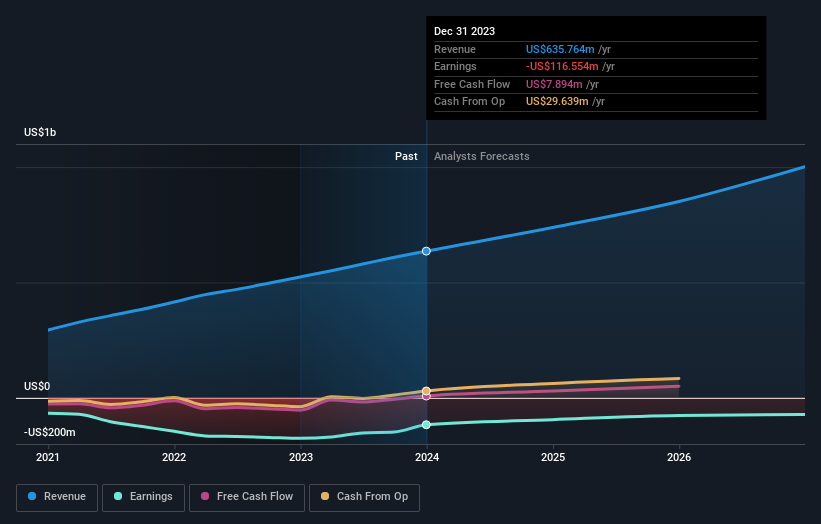- United States
- /
- Consumer Services
- /
- NYSE:COUR
US$23.42 - That's What Analysts Think Coursera, Inc. (NYSE:COUR) Is Worth After These Results
Shareholders might have noticed that Coursera, Inc. (NYSE:COUR) filed its full-year result this time last week. The early response was not positive, with shares down 8.3% to US$18.21 in the past week. The results look positive overall; while revenues of US$636m were in line with analyst predictions, statutory losses were 8.5% smaller than expected, with Coursera losing US$0.77 per share. Earnings are an important time for investors, as they can track a company's performance, look at what the analysts are forecasting for next year, and see if there's been a change in sentiment towards the company. So we gathered the latest post-earnings forecasts to see what estimates suggest is in store for next year.
View our latest analysis for Coursera

Taking into account the latest results, the most recent consensus for Coursera from 14 analysts is for revenues of US$738.0m in 2024. If met, it would imply a solid 16% increase on its revenue over the past 12 months. Losses are predicted to fall substantially, shrinking 27% to US$0.55. Before this earnings announcement, the analysts had been modelling revenues of US$727.4m and losses of US$0.77 per share in 2024. Although the revenue estimates have not really changed Coursera'sfuture looks a little different to the past, with a very promising decrease in the loss per share forecasts in particular.
These new estimates led to the consensus price target rising 5.2% to US$23.42, with lower forecast losses suggesting things could be looking up for Coursera. That's not the only conclusion we can draw from this data however, as some investors also like to consider the spread in estimates when evaluating analyst price targets. The most optimistic Coursera analyst has a price target of US$30.00 per share, while the most pessimistic values it at US$15.00. Note the wide gap in analyst price targets? This implies to us that there is a fairly broad range of possible scenarios for the underlying business.
Another way we can view these estimates is in the context of the bigger picture, such as how the forecasts stack up against past performance, and whether forecasts are more or less bullish relative to other companies in the industry. We would highlight that Coursera's revenue growth is expected to slow, with the forecast 16% annualised growth rate until the end of 2024 being well below the historical 24% p.a. growth over the last three years. By way of comparison, the other companies in this industry with analyst coverage are forecast to grow their revenue at 10% annually. So it's pretty clear that, while Coursera's revenue growth is expected to slow, it's still expected to grow faster than the industry itself.
The Bottom Line
The most obvious conclusion is that the analysts made no changes to their forecasts for a loss next year. Happily, there were no major changes to revenue forecasts, with the business still expected to grow faster than the wider industry. We note an upgrade to the price target, suggesting that the analysts believes the intrinsic value of the business is likely to improve over time.
Keeping that in mind, we still think that the longer term trajectory of the business is much more important for investors to consider. We have estimates - from multiple Coursera analysts - going out to 2026, and you can see them free on our platform here.
You still need to take note of risks, for example - Coursera has 3 warning signs we think you should be aware of.
New: AI Stock Screener & Alerts
Our new AI Stock Screener scans the market every day to uncover opportunities.
• Dividend Powerhouses (3%+ Yield)
• Undervalued Small Caps with Insider Buying
• High growth Tech and AI Companies
Or build your own from over 50 metrics.
Have feedback on this article? Concerned about the content? Get in touch with us directly. Alternatively, email editorial-team (at) simplywallst.com.
This article by Simply Wall St is general in nature. We provide commentary based on historical data and analyst forecasts only using an unbiased methodology and our articles are not intended to be financial advice. It does not constitute a recommendation to buy or sell any stock, and does not take account of your objectives, or your financial situation. We aim to bring you long-term focused analysis driven by fundamental data. Note that our analysis may not factor in the latest price-sensitive company announcements or qualitative material. Simply Wall St has no position in any stocks mentioned.
About NYSE:COUR
Coursera
Provides online educational services in the United States, Europe, Africa, the Asia Pacific, the Middle East, and internationally.
Flawless balance sheet and fair value.
Similar Companies
Market Insights
Weekly Picks


Crazy Undervalued 42 Baggers Silver Play (Active & Running Mine)


Fiducian: Compliance Clouds or Value Opportunity?

Willamette Valley Vineyards (WVVI): Not-So-Great Value
Recently Updated Narratives
China Starch Holdings eyes a revenue growth of 4.66% with a 5-year strategic plan

PSIX The timing of insider sales is a serious question mark


The Great Strategy Swap – Selling "Old Auto" to Buy "Future Light"
Popular Narratives


MicroVision will explode future revenue by 380.37% with a vision towards success


NVDA: Expanding AI Demand Will Drive Major Data Center Investments Through 2026




